Computer
2018-03-29
It's time to make a new computer. After five years using my old computer, I decided to upgrade. My old machine worked very well, so I don't plan on changing the style very much. My goal here was to build a fast, simple, and quiet machine. I'm not a gamer, so I don't need super-high-end hardware, and I'm not going to overclock anything. It's fun to put together a machine with the parts I want.
Hardware
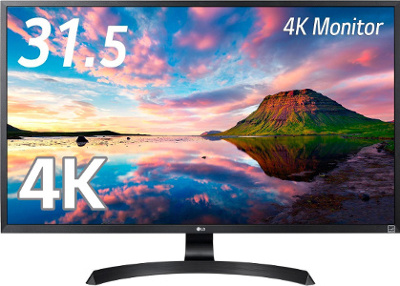 |
LG 32UD59-B | A 32" 4K monitor with built-in speakers. The maximum resolution is 3840×2160. It takes 50W of power. I have some nice Bose speakers, but since I can't play anything at loud volume in my apartment, most of the time I use headphones, and the speakers become paper weights. |
|---|---|---|
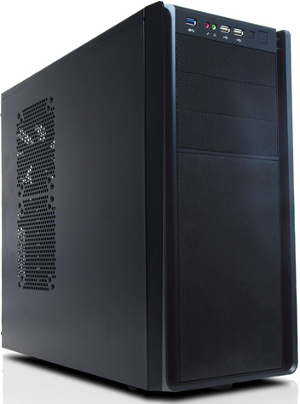 |
Scythe SCY-CFS3-BK | An ATX case that's relatively small. It has 5.25" bays on the front and allows for case fans on the top. Many new cases don't have exposed front drive bays, and if you want to use an optical drive or card reader, they aren't what you need. Although I didn't buy one, there are many slick affordable cases with glass sides on the market. It could be fun to get an illuminated motherboard or cooling fans and show off your stylish hardware. |
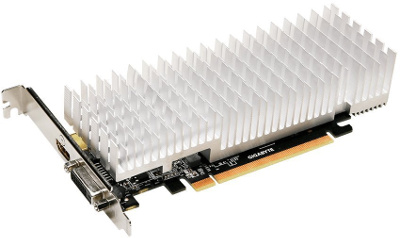 |
Gigabyte GT1030 | An NVIDIA graphics card. PCI-E 3.0, 2GB GDDR5 RAM, HDMI and DVI output. There are good (but proprietary) drivers for Debian (nvidia-driver). The card is passively cooled. It's not a high-end gaming card, but I'm not a high-end gamer. My old machine had on-board Intel graphics, which had excellent open-source drivers but was slow. |
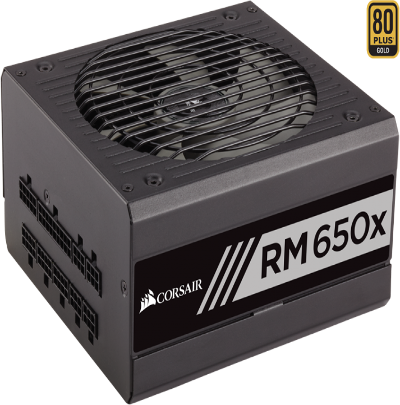 |
Corsair RM650x | A 650W power supply. 80 Plus Gold certified. Silent when power consumption under 260W. Like many mid-range power supplies on the market these days, this power supply doesn't start the cooling fan until the load rises. When the cooling fan isn't moving, it's silent. This is especially nice for a periodic power user like myself who pushes the machine hard on an irregular basis. |
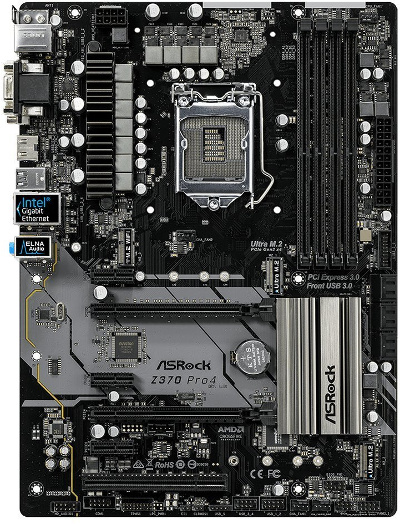 |
ASRock Z370 Pro4 | An ATX motherboard that holds Intel Z370 chips, socket LGA1151, with four slots for memory, an M.2 hard drive slot, and an M.2 wifi slot. I'm eager to try out an M.2 hard drive, because they're ridiculously fast. The M.2. WiFi is convenient because it's small, but WiFi is slow enough that a PCI card could probably perform comparably. ATX motherboards are handy because they have a lot of connectors and PCI slots, but most of them don't have on-board WiFi. If you need WiFi, you add either an M.2 card or a PCI card. I'm trying out M.2 because it's cheap and low-profile. |
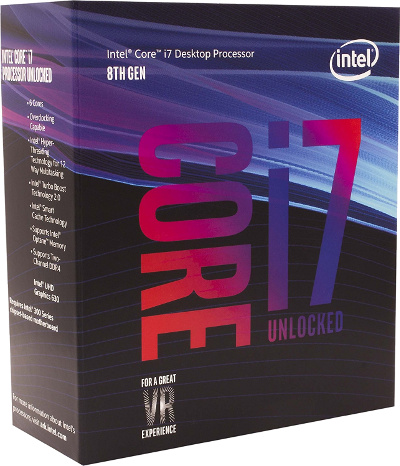 |
Intel i7-8700K | An i7 3.7 GHz processor. Socket 1151, 12 MB cache, 6 cores, 12 threads. This is a fairly high-end processor. |
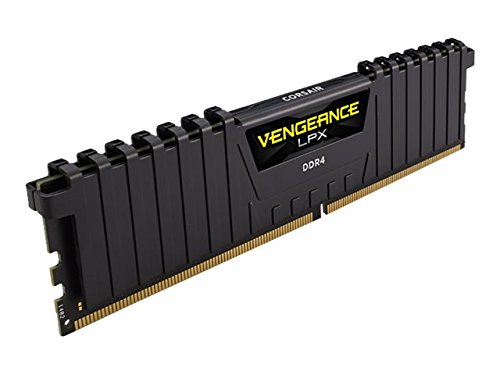 |
Corsair Vengeance LPX | Two 16 GB sticks of memory (32 GB total), DDR4-2666. According to the Internet, this quality of RAM (2666) gives good cost-performance relative to the next step up. My old machine had 16 GB of RAM, and I only maxed that out a few times, so 32 GB should keep me going for a long while. |
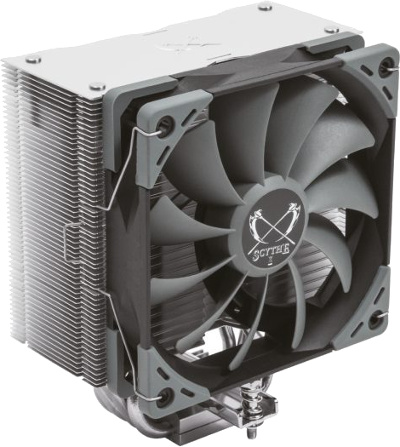 |
Scythe Kotetsu Mark II | A CPU cooler featuring a large heat sink and a 120 mm cooling fan. This barely fits in my case. I've used this style of heatsink before, and if you have the room in your case, it works well because the large heat sink lets you use a large cooling fan, and that cools everything well without making a ton of noise. The stock 120 mm fan is loud even when there's no load, and I replaced it with an Ainex CFZ-120GL. |
 |
OwlTech OWL-CR7U2B | A 3.5" card reader. I sometimes use this for the cards in my cameras and phones when transfer by USB cable is finicky. External USB card readers should work fine too, but some of them have Linux support issues, and the drive bay style keeps my workspace cleaner. Be careful of the difference between motherboard sockets for USB 2.0 and 3.0. My motherboard only has one 3.0 socket, and it was already in use, but it has three 2.0 sockets. This card reader plugs into one of the three. |
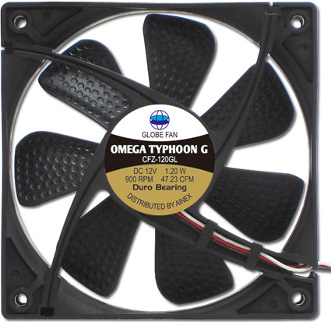 |
Ainex CFZ-120GL | A 120mm case fan that runs 900±200 rpm at a very quiet 10.8 dB. I use two: one for the front of the case, and the other on the heat sink. |
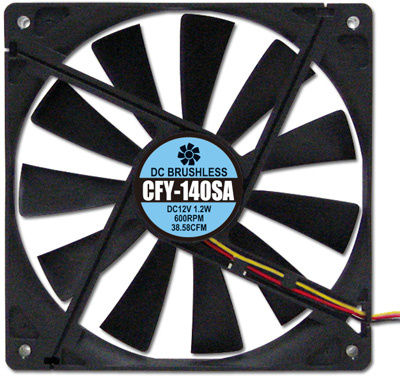 |
Ainex CFY-140SA | A 140mm case fan that runs 600 rpm at an incredibly quiet 7 dB. I like large case fans because the low speed keeps the noise down and lengthens the fan life. For the top of the case. |
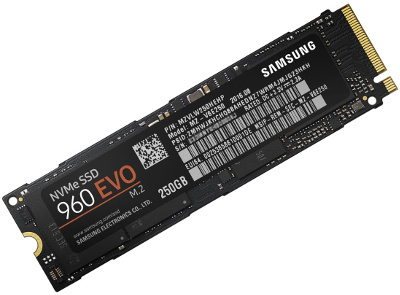 |
Samsung 960 EVO | An MVMe M.2 250 GB solid state hard drive. Sequential read 3,200 MB/s, sequential write 1,900 MB/s. When I got my first solid state hard drive five years ago, it was a jaw-dropping moment. Solid state hard drives are amazing. This one is reasonably fast, and M.2 is designed to provide faster access than SATA. On my old machine, my OS and software only take up 50GB of space, so this drive is a fine size. |
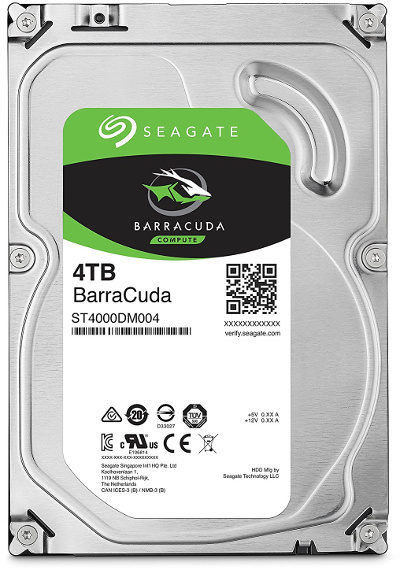 |
Seagate ST4000DM004 | A Seagate Barracuda 4TB 3.5" internal hard disk drive. 256 MB cache, 5,400 RPM, SATA 6.0 Gb/s. This is a large, slow, and inexpensive hard drive. You can get a solid state drive of a similar size for eight times the price, but I think this will handle large data storage well. |
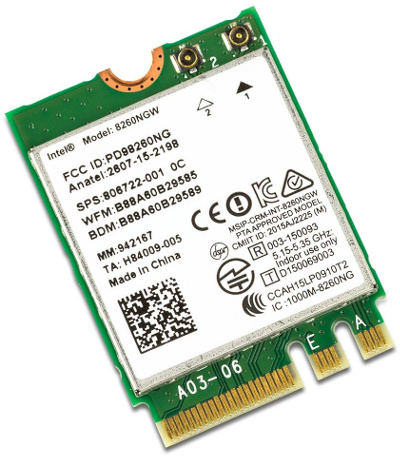 |
Intel AC 8260 | An M.2 WiFi card. 802.11 AC and Bluetooth 4.2. This fits directly on my motherboard. You have to get a separate antenna and connect it yourself. Depending on the make and model, Linux drivers for WiFi can be a problem, but Intel generally has great open source drivers. I stopped using this because the antenna connectors are tiny and tedious, and the large antennas are unwieldy. It worked fine, though. |
 |
Princeton PTM-UBT7 | A Bluetooth 4.0 USB dongle. This dongle is cheap and works perfectly right out of the package. |
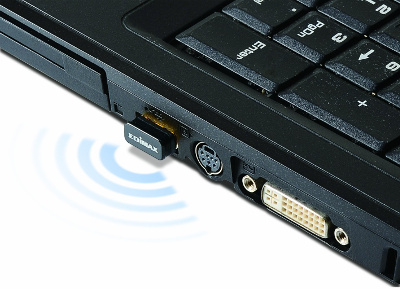 |
Edimax EW-7811Un | A 802.11N WiFi USB dongle. This tiny dongle provides 802.11B, G, and N support. It works right out of the package. Always check that there's Linux support for a WiFi card or dongle before buying one, because many of them don't work. |
System Information
$ uname --all Linux black 4.15.0-2-amd64 #1 SMP Debian 4.15.11-1 (2018-03-20) x86_64 GNU/Linux
Memory
$ free --human total used free shared buff/cache available Mem: 31Gi 3.7Gi 699Mi 678Mi 27Gi 26Gi Swap: 31Gi 171Mi 31Gi
Storage
$ df --human-readable | grep /dev/ | grep --invert-match tmpfs /dev/mapper/black--vg-root 197G 13G 174G 7% / /dev/nvme0n1p2 237M 75M 150M 34% /boot /dev/nvme0n1p1 511M 132K 511M 1% /boot/efi /dev/mapper/data_crypt 3.6T 142G 3.3T 5% /home/d/Data
PCI Bus
$ lspci 00:00.0 Host bridge: Intel Corporation Device 3ec2 (rev 07) 00:01.0 PCI bridge: Intel Corporation Xeon E3-1200 v5/E3-1500 v5/6th Gen Core Processor PCIe Controller (x16) (rev 07) 00:14.0 USB controller: Intel Corporation 200 Series PCH USB 3.0 xHCI Controller 00:14.2 Signal processing controller: Intel Corporation 200 Series PCH Thermal Subsystem 00:16.0 Communication controller: Intel Corporation 200 Series PCH CSME HECI #1 00:17.0 SATA controller: Intel Corporation 200 Series PCH SATA controller [AHCI mode] 00:1b.0 PCI bridge: Intel Corporation 200 Series PCH PCI Express Root Port #17 (rev f0) 00:1b.4 PCI bridge: Intel Corporation 200 Series PCH PCI Express Root Port #21 (rev f0) 00:1c.0 PCI bridge: Intel Corporation 200 Series PCH PCI Express Root Port #1 (rev f0) 00:1c.2 PCI bridge: Intel Corporation 200 Series PCH PCI Express Root Port #3 (rev f0) 00:1d.0 PCI bridge: Intel Corporation 200 Series PCH PCI Express Root Port #9 (rev f0) 00:1f.0 ISA bridge: Intel Corporation Device a2c9 00:1f.2 Memory controller: Intel Corporation 200 Series PCH PMC 00:1f.3 Audio device: Intel Corporation 200 Series PCH HD Audio 00:1f.4 SMBus: Intel Corporation 200 Series PCH SMBus Controller 00:1f.6 Ethernet controller: Intel Corporation Ethernet Connection (2) I219-V 01:00.0 VGA compatible controller: NVIDIA Corporation GP108 [GeForce GT 1030] (rev a1) 01:00.1 Audio device: NVIDIA Corporation GP108 High Definition Audio Controller (rev a1) 03:00.0 Non-Volatile memory controller: Samsung Electronics Co Ltd NVMe SSD Controller SM961/PM961 05:00.0 Network controller: Intel Corporation Wireless 8260 (rev 3a)
USB Bus
$ lsusb Bus 002 Device 001: ID 1d6b:0003 Linux Foundation 3.0 root hub Bus 001 Device 004: ID 058f:6364 Alcor Micro Corp. AU6477 Card Reader Controller Bus 001 Device 003: ID 0603:1605 Novatek Microelectronics Corp. Bus 001 Device 006: ID 8087:0a2b Intel Corp. Bus 001 Device 002: ID 04b4:ef0f Cypress Semiconductor Corp. Bus 001 Device 001: ID 1d6b:0002 Linux Foundation 2.0 root hub
Graphics
$ lspci -vnn | grep VGA -A 12 01:00.0 VGA compatible controller [0300]: NVIDIA Corporation GP108 [GeForce GT 1030] [10de:1d01] (rev a1) (prog-if 00 [VGA controller]) Subsystem: Gigabyte Technology Co., Ltd GP108 [GeForce GT 1030] [1458:375d] Flags: bus master, fast devsel, latency 0, IRQ 135 Memory at de000000 (32-bit, non-prefetchable) [size=16M] Memory at c0000000 (64-bit, prefetchable) [size=256M] Memory at d0000000 (64-bit, prefetchable) [size=32M] I/O ports at e000 [size=128] [virtual] Expansion ROM at 000c0000 [disabled] [size=128K] Capabilities: <access denied> Kernel driver in use: nvidia Kernel modules: nvidia 01:00.1 Audio device [0403]: NVIDIA Corporation GP108 High Definition Audio Controller [10de:0fb8] (rev a1)
$ nvidia-debugdump -l Found 1 NVIDIA devices Device ID: 0 Device name: GeForce GT 1030 (*PrimaryCard) GPU internal ID: GPU-2237f212-189a-c9d4-c09d-78d71f444811
Processor
$ lscpu Architecture: x86_64 CPU op-mode(s): 32-bit, 64-bit Byte Order: Little Endian CPU(s): 12 On-line CPU(s) list: 0-11 Thread(s) per core: 2 Core(s) per socket: 6 Socket(s): 1 NUMA node(s): 1 Vendor ID: GenuineIntel CPU family: 6 Model: 158 Model name: Intel(R) Core(TM) i7-8700K CPU @ 3.70GHz Stepping: 10 CPU MHz: 800.174 CPU max MHz: 4700.0000 CPU min MHz: 800.0000 BogoMIPS: 7392.00 Virtualization: VT-x L1d cache: 32K L1i cache: 32K L2 cache: 256K L3 cache: 12288K NUMA node0 CPU(s): 0-11 Flags: fpu vme de pse tsc msr pae mce cx8 apic sep mtrr pge mca cmov pat pse36 clflush dts acpi mmx fxsr sse sse2 ss ht tm pbe syscall nx pdpe1gb rdtscp lm constant_tsc art arch_perfmon pebs bts rep_good nopl xtopology nonstop_tsc cpuid aperfmperf tsc_known_freq pni pclmulqdq dtes64 monitor ds_cpl vmx smx est tm2 ssse3 sdbg fma cx16 xtpr pdcm pcid sse4_1 sse4_2 x2apic movbe popcnt tsc_deadline_timer aes xsave avx f16c rdrand lahf_lm abm 3dnowprefetch cpuid_fault epb invpcid_single pti tpr_shadow vnmi flexpriority ept vpid fsgsbase tsc_adjust bmi1 hle avx2 smep bmi2 erms invpcid rtm mpx rdseed adx smap clflushopt intel_pt xsaveopt xsavec xgetbv1 xsaves dtherm ida arat pln pts hwp hwp_notify hwp_act_window hwp_epp
